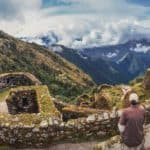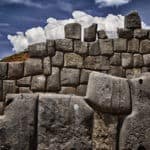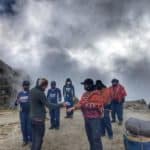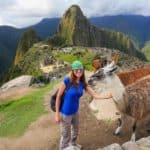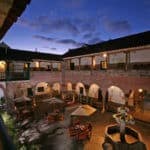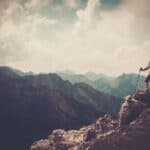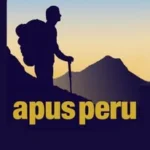Why should you choose the Huchuy Qosqo trek to Machu Picchu? Maybe you don’t have a lot of time in Cusco or maybe you didn’t book early enough to get Inca Trail tickets. Whatever the problem might be, you want a taste of Peru but aren’t sure how to get it. You want to visit Machu Picchu, you want to go trekking, and you would like to see the Sacred Valley, but how can you do all that in only a few days?
One option is Apus Peru’s three day Huchuy Qosqo Trek to Machu Picchu. If you want to know more, keep reading for a detailed look at this adventure.
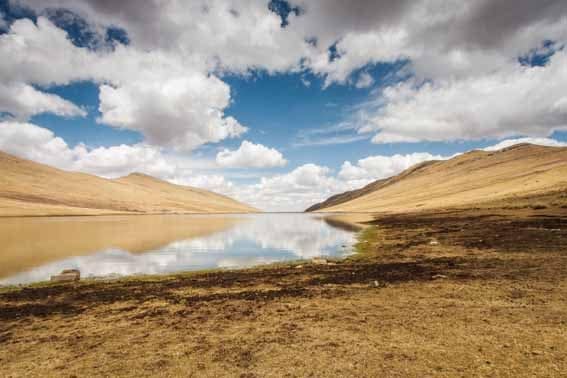
Starting Out on the Huchuy Qosqo Trek to Machu Picchu
A note on pronunciation: Huchuy (hoo-chooey) Qosqo (kosko) means “Small Cusco” in Quechua.
It doesn’t take long to reach the entrance to the Tambomachay ruins above Cusco. These royal baths once served as a retreat for the city’s noble class and today act as the trailhead for Apus Peru’s Huchuy Qosqo trek. From the field where the Apus Peru van stopped to unload gear and meet our horsemen, I could see the Tambomachay ruins below, and more Inca ruins on a hill across the road.
Apus Peru also offers a two day hike to Huchuy Qosqo that doesn’t include Machu Picchu.
Once the horses were packed with equipment, our guide, Herbert, led the way up a dusty road crisscrossed with sheep and llama prints. It was mid-morning and the clouds hung low over the ridge to our right. I knew from previous hikes in these hills that we would have to cross those mountains before the day was over.
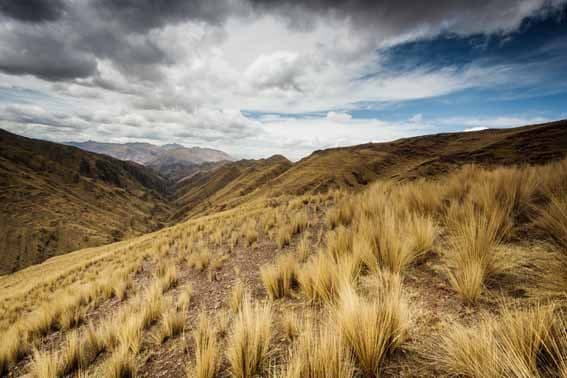
One of the Easier Hikes in Cusco
The real climbing began a kilometre or so past the trailhead. After we walked through a valley and a small stream where flocks of sheep spread out among the low vegetation, the trail cut sharply upward and bushes gave way to long bunches of Andean grass. Compared to some of the more extreme terrain mountains in Peru can offer, this trek is on the easy side but as we crested the first ridge everyone was breathing hard.
We climbed more ridges and looked down the walls of plunging canyons where rivers make their escape from the highlands. After more than three hours of walking we caught up to the team of horsemen and cooks who had set-up a tent on the shore of a lake where llamas eyed us suspiciously as they drank. Using only the gear they and their horses could carry, the cooks served us a meal that equalled most meals I had in Cusco.
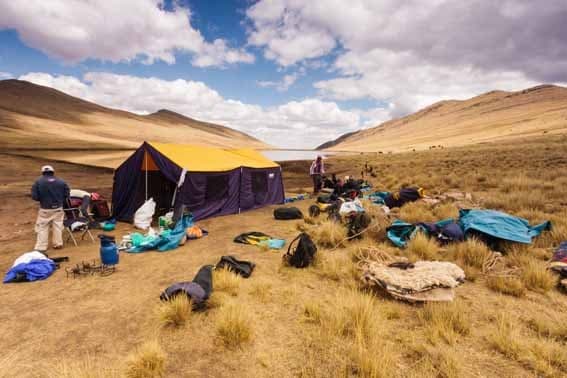
More Adventure to Come on the Huchuy Qosqo trek to Machu Picchu
Rested and fed, we continued on. One, two, three more ridges passed under our feet before we reached the final descent to our campsite. Standing on top of that last ridge, almost 4,300 meters above sea level, I felt a mixture of excitement and accomplishment. All of the “hard” trekking was done, but most of the adventure was still ahead.
That night we slept in tents under stars with a brilliance that can only be seen in the high mountains. All around us the sounds of life in the Andes echoed; sheep called out to their lambs and dogs chased each other down the mountainside.
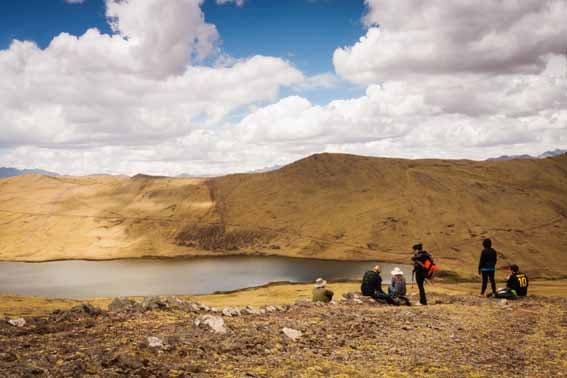
When morning came and we started on the trail again, the landscape changed quickly. We had left the wide livestock paths of the highlands and joined a restored section of Antisuyo — one of the four Inca trails that leave Cusco. This trail that once connected the Inca’s capital city to the northeastern section of the empire winds through a canyon where a gentle stream cascades down rocks. As the canyon narrows, the river drops away while the trail clings to the walls, where it navigates steep drops with a series of bridges and ladders.
Dramatic Views Over the Sacred Valley and the arrival at Huchuy Qosqo
After we left the canyon, dramatic views of the Sacred Valley opened up in front of us. At some points the slope on the edge of the trail dropped almost vertically 1,000 meters to the valley floor. Unobstructed views of the cities and farms in the valley continued until we reached Huchuy Qosqo itself, a set of ruins with a commanding view of its surroundings.
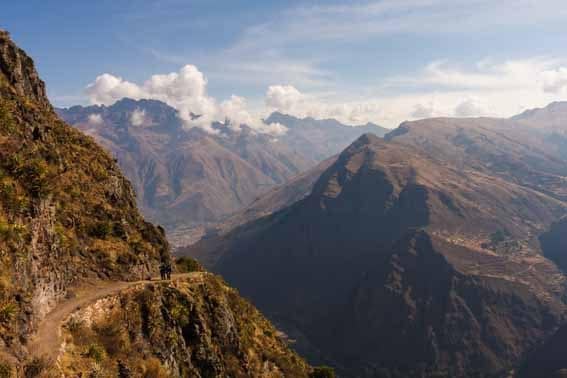
We stopped to admire the stonework and learn more about the history of this mountain village before a steep descent into the Sacred Valley. We ate lunch in the shade of tall eucalyptus trees and rested. After a short drive, we boarded a train in Ollantaytambo and watched the epic scenery of the northern Sacred Valley emerge. The sun had sunk behind glaciated peaks when we arrived in Aguas Calientes at the foot of Machu Picchu (“old peak,” in Quechua). Here, the dry and rugged landscape around Cusco had given way to warm jungle and rushing water.
Machu Picchu Emerging from the Mist
Before the sun rose the next morning, we were already standing in line for the bus that would take us to the “Lost City of the Incas.” A half-hour after boarding the bus we were standing at the entrance gate and in a few minutes more had taken our place on mist shrouded rocks to learn more about this enigmatic city.
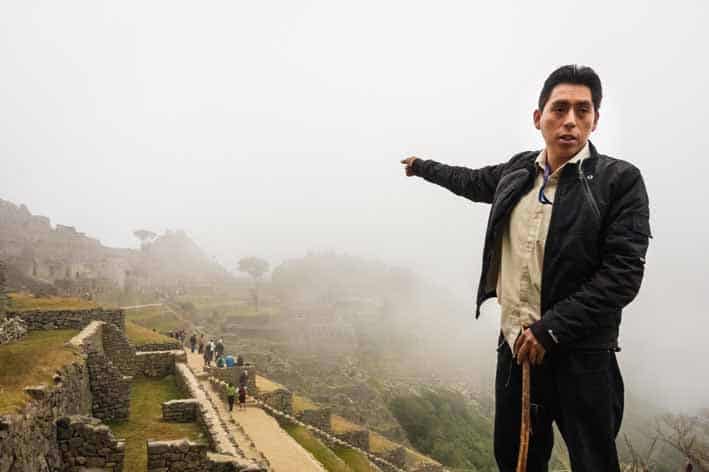
It is possible to explore Machu Picchu without a tremendous amount of physical exertion. But I was on a trek and decided my day wouldn’t be complete without conquering Huayna Picchu, the often photographed and less often climbed mountain behind the ruins.
READ MORE about what there is to see and do while visiting Machu Picchu.
The way up Huayna Picchu is not for the faint of heart. Steep stairs are flanked by cables to ensure tourists don’t go tumbling off into the jungle below. The higher you climb, the steeper and more extreme the landscape becomes. Towards the top, a battlement of ruins encircles the peak which is gained only by scrambling up rocks or climbing a ladder.
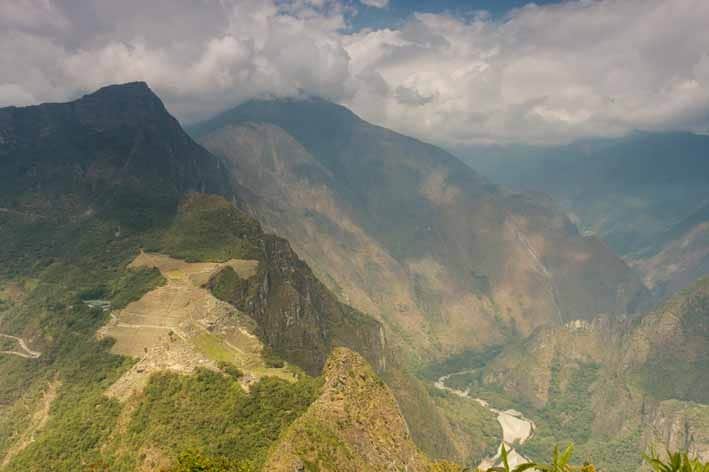
There is a rumor going around that someone once ran up Huayna Picchu in a little more than 10 minutes. I reached the top in just over 50 minutes and watched the world spread out beneath me. I looked down on a view of Machu Picchu I had never seen before — not even in photos. All around me I could see the tops of high mountains and below I witnessed the Urubamba River snake its way around the Sacred Valley.
Why Trekking in Peru is Special
I think there is something special about seeing Peru on foot. Maybe it’s because you are seeing the country the way its earliest residents did or maybe it’s because walking allows you better access to the abundant nature. Whatever the reason, there are few things that compare to reaching the highest pass on your trek, sleeping beneath uncovered stars, or climbing precarious stairs to look down on the ruins of an ancient city.
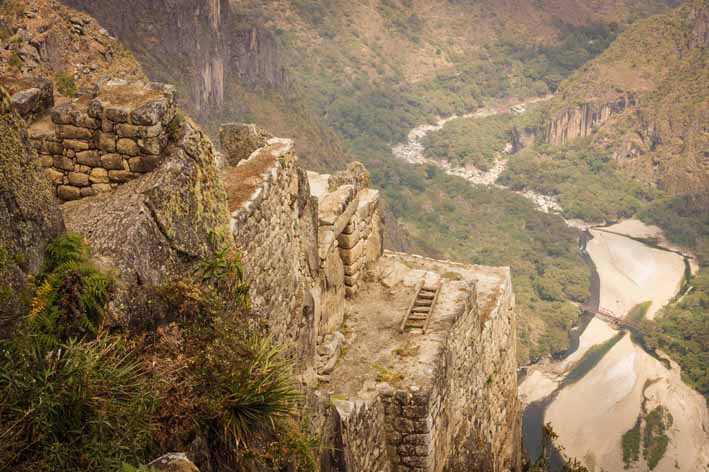
Want to Go?
You can hike to Huchuy Qosqo, with or without also going to Machu Picchu. Check out the trek descriptions at the links below or get in touch with one of our trek experts today to get started.
See more short treks around Cusco.
Story and photos by Isaiah Brookshire. Originally published on 25 October, 2012; updated on 2 August, 2019.

